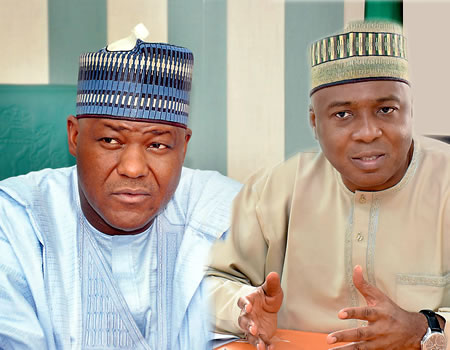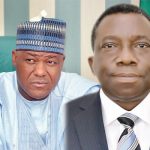
Group Politics Editor, Taiwo Adisa, reports the series of altercations that engulfed the venue of National Assembly management retreat in Kaduna over the demand for open National Assembly.
From April 2 to 7, top Management Staff of the National Assembly again converged on Kaduna city for the second leg of the Management Retreat aimed at retooling the legislative bureaucracy for a better National Assembly. Flowing from the first leg which took place in Lokoja, Kogi state, the Kaduna retreat was tailored in similar manner and meant to feature similar topics and Resource persons.
Though the second leg was meant to be a continuation of the Lokoja programme, more fireworks were let loose at the Kaduna end, especially at the closing ceremony than anyone expected.
The organisers had planned that the Speaker of the House of Representatives, Honourable Yakubu Dogara would perform the closing ceremony on Kaduna just as the opening was performed in Lokoja by the Senate President, Dr Bukola Saraki.
Somehow, more interests crept into the final day programme and it turned out to kick start a big debate on not just the running of the National Assembly, but the transparency of its budgeting process.
Chief of Staff to the Senate President, Dr Hakeem Baba-Ahmed was to introduce the first dimension when he delivered a thought provoking paper on ethics in public service. He challenged the bureaucracy at the National Assembly and the National Assembly Service Commission (NASSCOM) to redouble their efforts and earn their pride of place in building an effective legislature. He said that the public service is meant for people who are ready to serve, adding that anyone who has not made up his mind on service to the society has no business being there.
According to him, a weak legislative bureaucracy will produce a weak legislature adding that the bureaucracy needed to be strengthened while also erasing the wrong impression that the NASS bureaucracy was not as good as the bureaucracy that services the executive. He said that the bureaucracy must be ready to tell the political arm the truth at all time.
He also opined that the bureaucrats in the legislature have more tasking assignment as they are not just saddled with many masters, but have to contend with massive turnover of legislators after every election season.
Clerk to the National Assembly, Alhaji Mohammed Sani-Omolori told his colleagues that the gathering was meant to sharpen their skills ahead of the challenges ahead. He commended the cooperation granted his management team by the political arm of the National Assembly, which he said made the retreat possible.
It was not long when the controversies hit the airwaves. Kaduna State Governor, Mallam Nasiru el-Rufai, who was called to make some remarks, but turned around to deliver a full paper, tackled the political and management wing of the National Assembly. First, the Governor told the political wing of the National Assembly that they have a duty to preserve the bureaucracy as according to him, only a competent bureaucracy can help an office holder succeed.
He stated that when he was younger, he had seen the bureaucracy as a problem to developmental initiatives but added that right now, he believes that the bureaucracy is the engine room of development. He said that when he left office as Minister of the Federal Capital Territory (FCT) he was prosecuted and persecuted, but the efficiency of the FCT bureaucracy helped to vindicate him.
El-Rufai also threw up a debate as to whether Nigeria can make do with a unified bureaucracy rather than the distinct bureaucracies we currently operate. He told the gathering that the issue he threw up was an ongoing debate as opinions remained varied on the ideal situation.
While harping on the need for open National Assembly, el-Rufai said that the NASS must address its image problem, as according to him, many out there see the legislature as an opposition to the fight against corruption.
“The NASS, the Senate in particular, is seen as an opposition to the fight against corruption. It is an image the NASS has to work on. For instance, a lot of people don’t know what your budgets look like.
“There is secrecy around your budgets. I see a lot of publications about what you earn, which I don’t believe are true, but as far as you don’t work on these issues, you will not be helping the National Assembly.”
Senate Leader, Senator Ahmad Lawan, who was the next to speak, attempted some answers to the questions thrown up by el-Rufai. He declared that the budget of NASS was not a secret document, adding that since the funds meant to run the National Assembly were drawn from the national budget, the details were out there for anyone who is interested.
The Senate Leader declared that the NASS Bureaucracy was the engine room of democracy adding that the bureaucrats train the lawmakers in the difficult task of lawmaking. He stated that the job of the bureaucrats has been made difficult because they had to consistently train new hands after every four years since close to 80 percent of the lawmakers don’t return to the chamber after each election circle.
Replying el-Rufai directly, he said: “We in the National Assembly fight corruption by the support we give to the executive. We created the anti-graft agencies and funded them from the scratch. We fund them through the budgets.
“Our budget is already out there in the public because whatever we earn is taken from the budget of the Federal Government. The NASS require proper funding. Most of us work in NASS and carry files home, because there are no quality hands to assist us and in most cases our budget cannot pay for quality hands.”
He, however, warned political office holders especially those stoking executive/legislature feuds to desist because Nigerians voted for the government of All Progressives Congress to deliver positive change.
“The Nigerian public cannot distinguish between the executive and the legislature. All they are after is performance. Change has come to stay in Nigeria, but if we don’t perform, Nigerians are ready to change the change. I believe you will have no reason to do that.”
Speaker of the House of Representatives, Honourable Dogara, who declared the retreat closed, decided to frontally tackle the Kaduna Governor over his comments on open National Assembly.
He declared that the National Assembly’s budget system was open enough, adding that the management of NASS has been directed to publish the budget this year.
He, however, asked Nigerians not just to focus on the legislature in their quest for openness, adding that the battle should be holistic enough, spanning all the arms of government.
He stated that state governors were not helping the anti-corruption war of the Buhari administration by keeping records of their security votes and earnings of the local governments secret.
Dogara said: “I will like to challenge him (El-Rufai) to champion this cause for transparency in the budgetary process from the National Assembly to other arms of government. The Judiciary first. We want to see clearly how Chief Executives of States… how they are paid. What do they spend monthly as security votes? And if they can publish what happens to local government funds under their jurisdictions that will help our discussion going forward.”
The Speaker further declared that the National Assembly is the most misunderstood institution among the arms of government, adding however, that no parliament in the world can win popularity contest especially with the executive.
“When, for instance, public discussions on funding of the legislature are being made, the entire bureaucracy is often completely discountenanced, neither is any consideration given to the fact that this is a special bureaucracy saddled with a multitude of ‘masters’ who must be equally served in addition to service to the nation,” he said.
He further spoke on the key issues and necessity for the retreat thus: “As leaders, you must be prepared to motivate the workforce. Motivation is the key to innovation anywhere. For far too long, the bureaucracy in Nigeria has failed to innovate because it is locked in a tradition that defines boundaries that must not be crossed. A tradition that says we have always done it this way and apportions sanctions for those who dare doing it the other way even if the outcomes are better. These are chains that bind the bureaucracy in Nigeria from within. Although the most difficult chains to break are those within us, we must break them in order to free the bureaucracy and make it competitive and innovative. The key to achieving this is undoubtedly, training and retraining in an environment such as this.
“The necessity for every manager to fully understand the ecology of his organisation is not negotiable. The legislature is a distinct organisation with several peculiarities, thereby making strategic management approach an imperative. The management of the National Assembly, whatever their managerial competencies, cannot provide efficient and effective services to the legislature except they fully understand and appreciate the organisational goals, objectives and the attendant challenges.”
WATCH TOP VIDEOS FROM NIGERIAN TRIBUNE TV
- Let’s Talk About SELF-AWARENESS
- Is Your Confidence Mistaken for Pride? Let’s talk about it
- Is Etiquette About Perfection…Or Just Not Being Rude?
- Top Psychologist Reveal 3 Signs You’re Struggling With Imposter Syndrome
- Do You Pick Up Work-Related Calls at Midnight or Never? Let’s Talk About Boundaries






